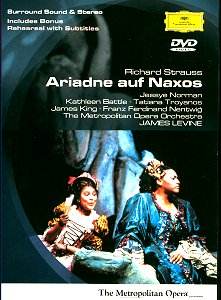This is a DVD of a televised live performance at the
Metropolitan Opera House recorded in March 1988. Levine had already
produced two years earlier a CD with the Vienna Philharmonic recorded
in the Musikverein. The singers were different from the Met production
apart from Kathleen Battle, a protégée of Levine’s, who
sings her much acclaimed Zerbinetta. The DVD is marginally bigger gunned
vocally with veteran Straussian James King as the Tenor/Bacchus and
up and coming Barbara Bonney and Dawn Upshaw in the smaller parts of
Naiad and Dryad. The main difference is Jessye Norman who's big, rounded,
mezzoish sound is quite different from the keener edged tone of Tomowa-Sintow's
Prima Donna/Ariadne. Who you prefer is a matter of taste.
In the DVD it is Jessye Norman who makes the strongest
contribution. Her Ariadne is noble, deeply committed and moving. The
camera is less than kind cosmetically, relentlessly focussing on a face
perpetually pouring with sweat. However, this does add to the sense
of emotional commitment, something of which James King cannot be accused.
Now Bacchus is not an easy role. He comes on towards the end and without
much warm up is soon plunged into a love duet involving some very taxing
vocalising. And vocally James King, already well past sixty, copes remarkably
well. I have heard some excruciatingly strangulated Bacchuses in my
time and others who have been drowned out by heavyweight Ariadne’s.
I've seen Jane Eaglen blast a Bacchus out of vocal sight. Not so James
King. His trouble is the emotional commitment, standing around staring
at his Ariadne with a kind of detached bemusement. Bearing in mind the
opera's potentially powerful dénouement, this is a serious drawback.
One feels sorry for Jessye Norman having to carry the emotion of the
final scene on her own, which she does with great professionalism.
There is one other drawback for me. James Levine's
conducting. Strauss's score is sumptuous and one wishes he had written
more for these reduced, almost chamber-like resources. The Met orchestra
under Levine supplies sumptuous playing to match. But with his tempi
he overindulges to an extent which repeatedly results in a failure of
momentum. Most of the time it is no more than a subtle rubato, but it
starts towards the end of the introduction and inexorably takes its
toll as time goes on. There is one passage that well illustrates how
damaging this can be. Ariadne's great soliloquy in the "Opera"
second half, "Es gibt ein Reich", is one of those great sweeping
paragraphs so characteristic of Strauss where he aims unerringly throughout
at an overwhelming home key resolution followed by a dying away, reaffirmation
of the tonic. Strauss does that famously in the Rosenkavalier trio and
here, similarly, as the music mounts its run up to the marvellous B
flat homecoming the effect can lead one to consider it one of the great
soprano moments in opera. It sounds so in Rudolf Kempe’s recording with
Gundula Janowitz where the result is achieved by an absolutely steady,
thrilling momentum. It is a lesson in Strauss conducting. Levine just
cannot help holding slightly as he approaches climaxes, trying to squeeze
the most out of the music – which it doesn’t, although to be fair he
is less guilty than in his Vienna CD recording. Perhaps he loves the
music too much for in the accompanying little, fascinating documentary
which includes fly-on–the-wall clips of piano rehearsal of him and Norman,
they both go into raptures about the score. "What fantastic music",
says Levine. Well you can’t argue with that. It is not the only thing
he eulogises about. When Kathleen Battle arrives for her turn he is
heard to say, "My God, you look beautiful". You can’t argue
with that either.
Overall the production fairs very well, the contrast
between the four male harlequinaders and the three ethereal sounding
women ( Naiad, Dryad and Echo) is effective as is the harlequinade stage
business. This is a well tried production if ever there was one, being
twenty eight years old at the time. When Karl Böhm, a great Strauss
conductor, directed its first performance in 1962 it was, astonishingly,
the US premiere.
Eighteen years before that, on 11th June 1944, Böhm
conducted a performance of Ariadne at the Vienna Opera. As
the war headed towards its close Vienna was in a bad state, its people
suffering much hardship but there was a full house for this great occasion
which was part of the composer’s eightieth birthday celebrations. Sitting
there in his box, Strauss would have been to the audience, performers
and those listening to the live radio broadcast, a legend in his lifetime
(a young Solti meeting him at his villa two years later said it was
like visiting God). A recording is available on CD, and penetrating
through the limitations of that nearly sixty year old sound - not to
mention all the Viennese coughing (in June?) – is an electricity that
shivers the spine. There is a sense that the performers, especially
Maria Reining and Max Lorenz in the final scene are, to put no finer
point on it, busting their guts for Strauss. Overwhelming. What a birthday
present. Somebody should give it to James Levine for his birthday.
John Leeman


